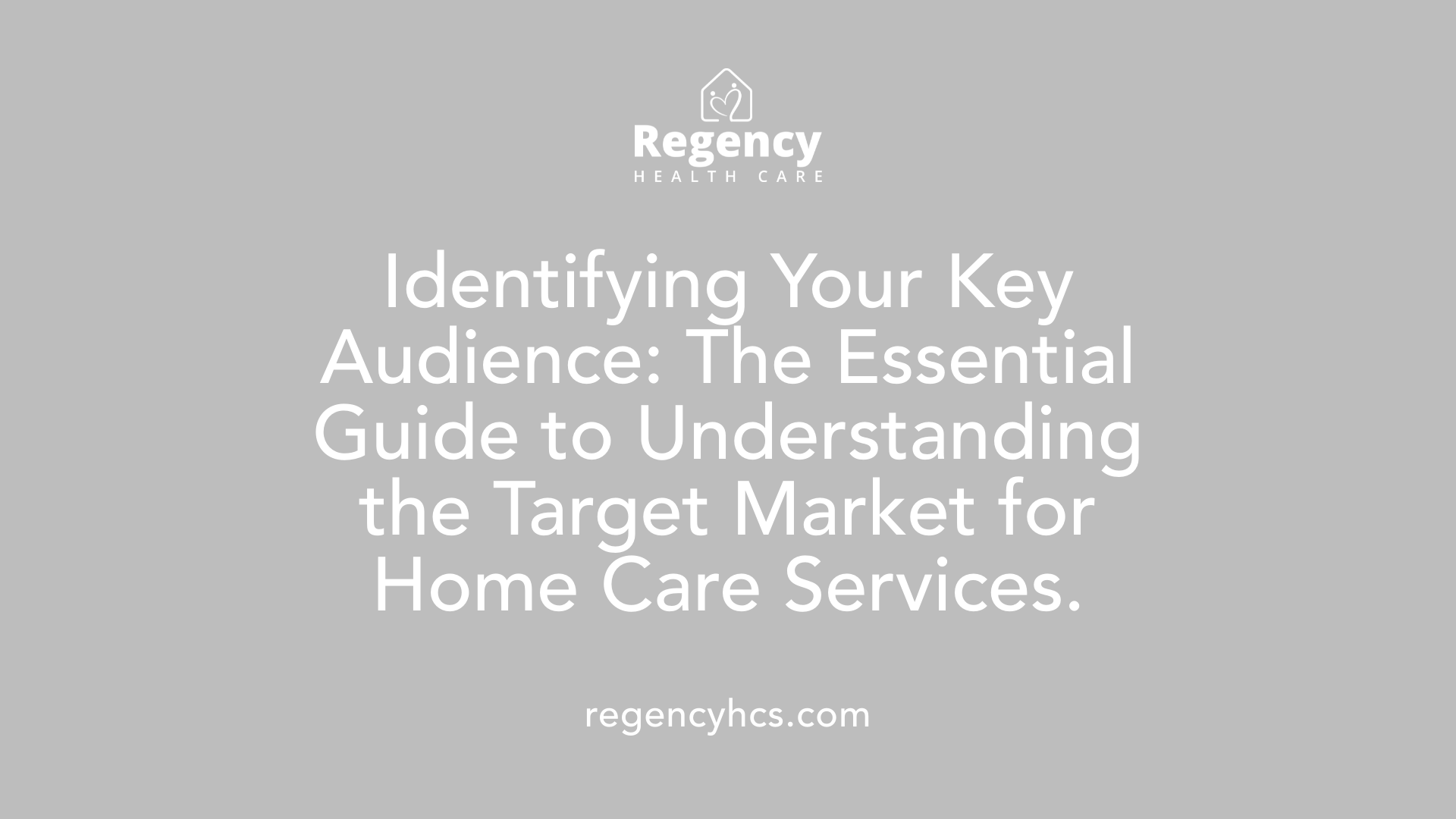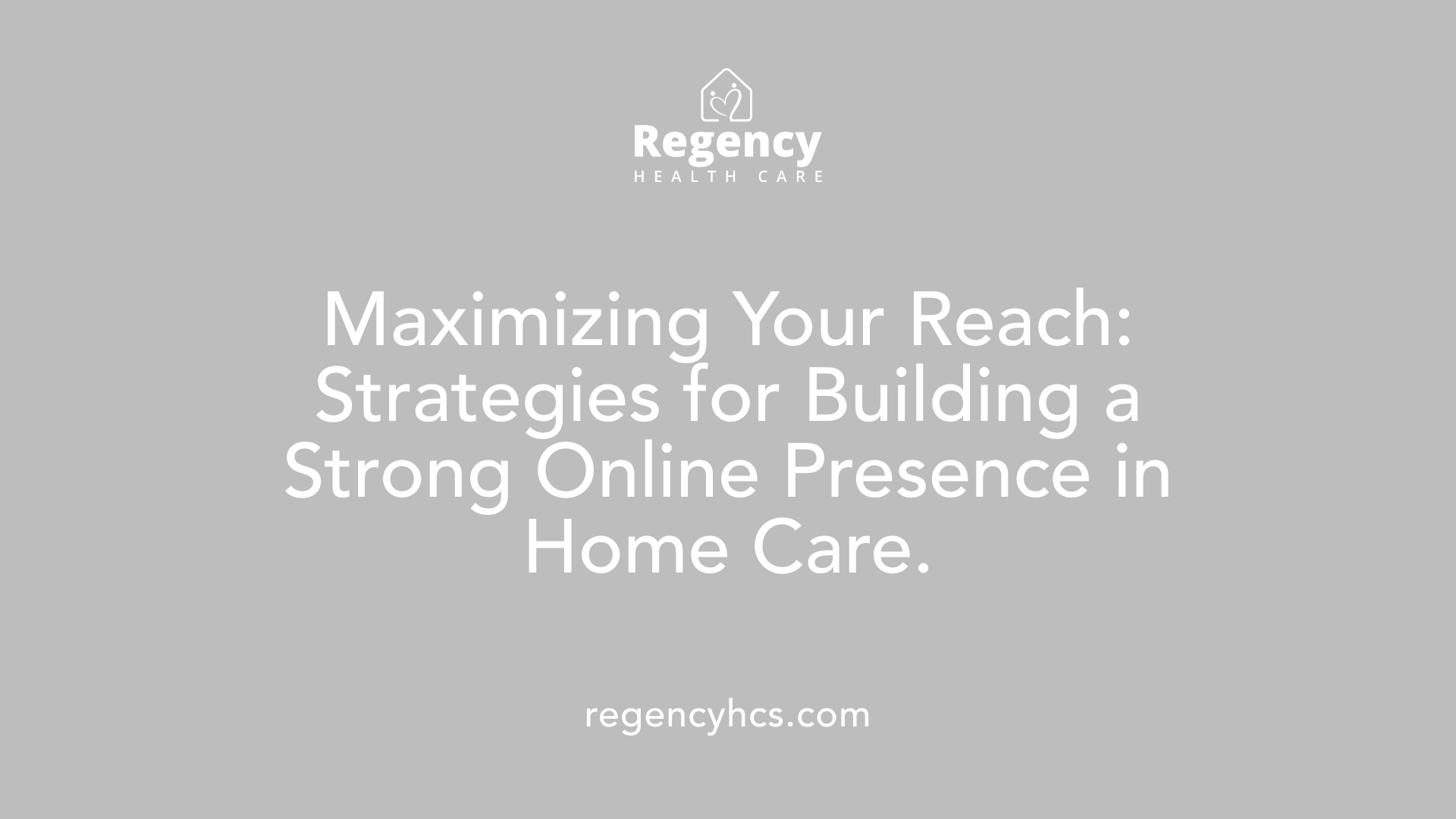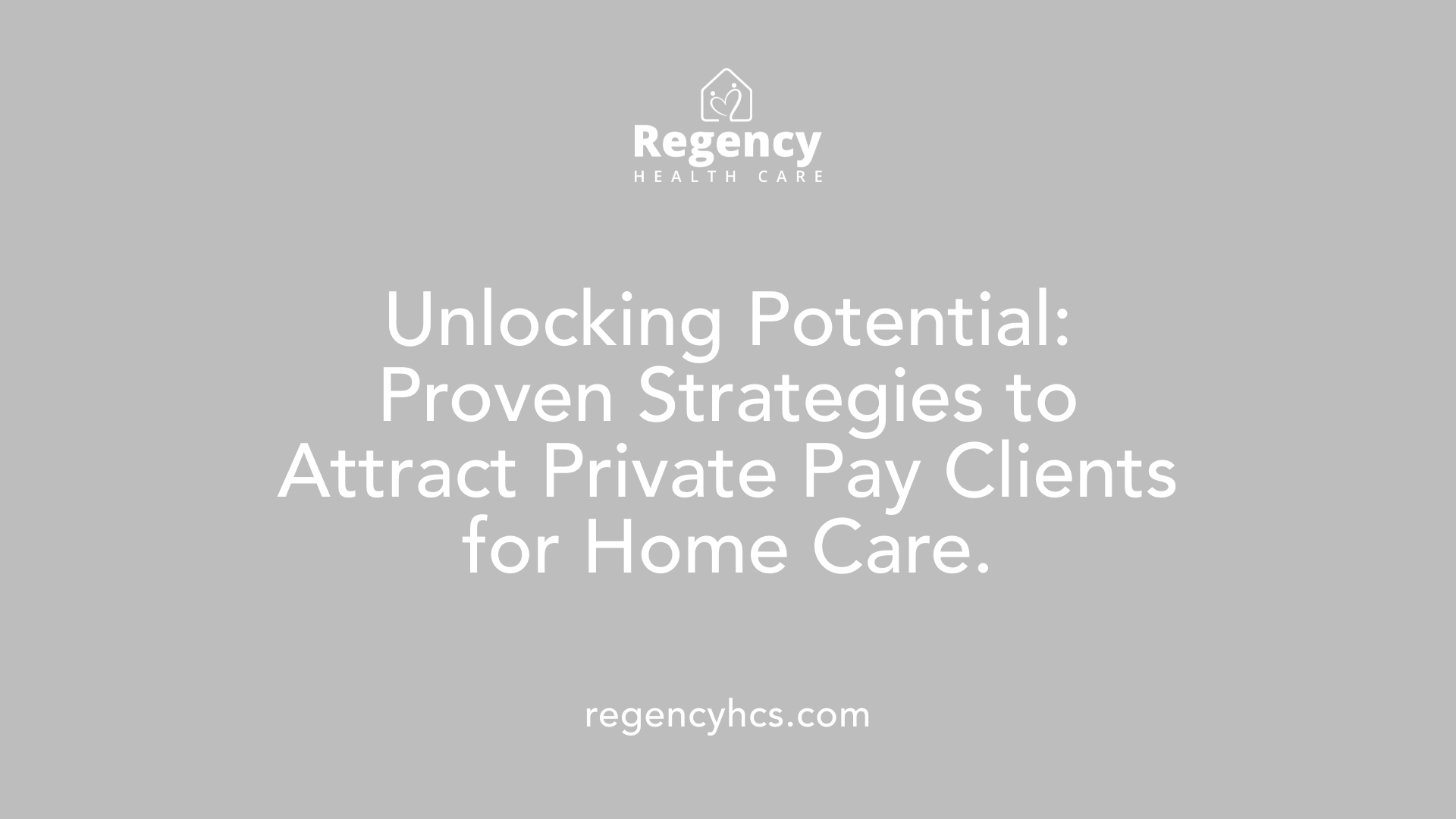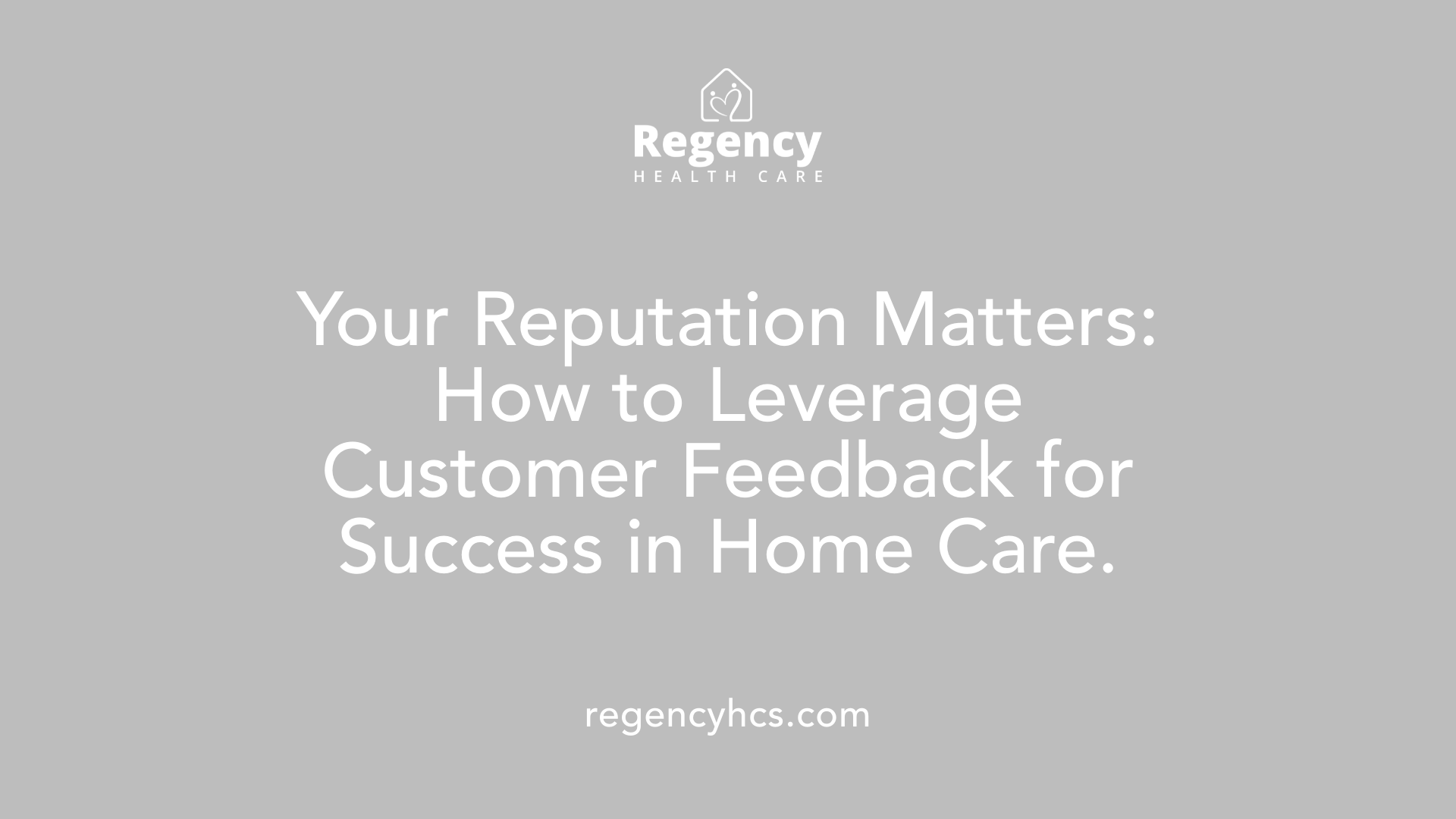Introduction to Private Pay Home Care Marketing
In an increasingly competitive landscape, private pay home care agencies must distinguish themselves by adopting innovative marketing strategies that align with industry best practices. This article sheds light on the various multimodal marketing approaches home care businesses can leverage to effectively reach and retain clients.
Understanding the Target Market

What is the target market for home care services?
The target market for home care services primarily includes the elderly, individuals with disabilities, and those recovering from illnesses. This demographic often requires assistance with daily activities, medical care, and companionship. Additionally, family caregivers seeking support for their loved ones may also be a significant segment of the market. Home care services can be particularly beneficial for individuals managing chronic conditions, providing the necessary support right in their homes.
Demographics of the target market
The elderly population, often over the age of 65, is the most significant portion of this market. According to recent statistics, individuals aged 65 and older are projected to represent 21% of the U.S. population by 2040. It's crucial for home care agencies to focus on this demographic and understand its specific needs to tailor services effectively.
Needs of elderly clients and family caregivers
Elderly clients typically require companionship, assistance with daily living activities, and sometimes medical attention or rehabilitation support. This is coupled with family caregivers' need for respite and assistance to balance their own responsibilities. Understanding these layers of needs allows agencies to develop services that resonate well with both the elderly and their caregivers, ultimately fostering better outcomes and customer satisfaction.
Building an Effective Online Presence

How do I market my home health care business?
To effectively market your home health care business, establishing a strong online presence is vital. This can be achieved through various digital marketing tools:
- Social Media Platforms: Utilize platforms like Facebook and LinkedIn. Engage with potential clients and caregivers by sharing valuable content. Regular updates keep your agency top-of-mind and help build relationships.
- SEO and Online Advertising: Optimize your website for search engines. Focus on local SEO to ensure your agency ranks high when potential clients search for services in your area. Invest in Google Ads targeting relevant keywords. This digital advertising strategy can quickly increase your visibility and attract leads actively seeking home care services.
- Content Marketing: Regularly publish informative blog posts on your website. These posts not only educate your audience but also improve your site's SEO and establish your expertise in the field.
Moreover, cultivating relationships with healthcare professionals is crucial. Referrals from satisfied clients, as well as network ties, can significantly boost your business through word-of-mouth recommendations. Participating in community events also enhances brand awareness, allowing for direct interactions with potential clients and their families.
Lastly, ensure that your agency highlights its unique selling points across all marketing materials to stand out in a competitive landscape.
Getting Private Pay Clients

How do I get private pay clients for home care?
Attracting private pay clients for home care hinges on establishing a strong reputation rooted in exceptional care and effective communication. Word-of-mouth referrals from satisfied clients can drive much of your business, as they generate trust and credibility in a competitive landscape.
Digital marketing strategies are equally important. Consider these approaches:
- Social Media Engagement: A strong presence on platforms like Facebook can connect you with potential clients while showcasing your services.
- Google Ads: Targeted online ads can effectively reach demographics actively searching for home care services.
- Optimize Google My Business: Ensure your profile is complete and regularly updated to enhance local visibility, as completing this can double your perceived reputation.
Networking with healthcare professionals is another effective strategy. Engaging with local providers, such as primary care doctors and physical therapists, can generate warm referrals that are crucial for expanding your client base.
Financially, allocate 5% to 10% of your revenue for marketing initiatives. New agencies should invest at the higher end of this range to establish themselves; established ones can spend 2% to 5%. Offering flexible and tailored services can further appeal to clients seeking personalized care options.
Free and Cost-Effective Marketing Strategies
What are some free marketing strategies for private pay home care?
Home care providers can tap into multiple free marketing strategies to attract private pay clients.
Optimize Google My Business:
Creating and maintaining a comprehensive Google My Business (GMB) profile is crucial. This profile will enhance your agency's visibility in local searches and establishes credibility among potential clients. Ensure that all information is up-to-date, including services offered, hours of operation, and contact details. A complete GMB profile significantly boosts online trust, making your agency more likely to appear in relevant searches.
Engaging in Community Activity:
Actively participating in local community events can greatly increase your agency’s visibility. These gatherings allow you to network and build personal connections with families who may be seeking home care services. Additionally, volunteering to host workshops or informational sessions can establish your authority and showcase your commitment to the community.
Cultivating Referrals:
Networking is another effective strategy, especially leveraging existing relationships with satisfied clients and other healthcare professionals. Word-of-mouth referrals can lead to a significant number of leads, as personal recommendations are highly regarded. Encourage current clients to spread the word about your services and consider implementing a referral program to incentivize these recommendations.
By combining these strategies, home care agencies can effectively attract new clients without incurring significant costs, strengthening their market presence along the way.
Applying the Four Main Marketing Strategies to Home Care
What are the four main marketing strategies and how do they apply to home care services?
The four main marketing strategies are market penetration, market development, product development, and diversification. These strategies can play an essential role in enhancing the growth and reach of home care agencies.
Market Penetration
Market penetration focuses on increasing the agency's market share within its existing service area. This can be achieved by enhancing service quality, improving customer engagement, and utilizing competitive pricing. For example, a home care agency might offer promotional pricing or bundled services to attract new clients while ensuring existing clients receive exceptional support, thereby fostering word-of-mouth referrals.
Market Development
Market development involves expanding services into new geographic regions or targeting specific demographics. For instance, agencies can identify underserved areas in their locality or reach out to populations like seniors and individuals with disabilities. Partnering with local healthcare providers or participating in community events can facilitate this expansion as it helps in building awareness and trust within new communities.
Product Development
Product development in home care involves creating or modifying services to meet the evolving needs of clients. Agencies could introduce specialized care programs, such as dementia care or chronic illness management, thereby addressing specific client needs and enhancing their service portfolio.
Diversification
Diversification, while riskier, can lead to substantial rewards. Home care agencies could branch into complementary services, like home technology support or wellness programs, further strengthening their market position and creating new revenue streams. By aligning with emerging trends in health and technology, agencies can differentiate themselves in a competitive landscape and provide additional value to clients.
These strategies, when implemented effectively, can enhance the visibility and appeal of home care services, driving growth and client satisfaction in an increasingly competitive market.
Implementing Referral and Partnership Programs
How Can Referral Networks Boost Client Acquisition?
Building strong referral networks is vital for home care agencies seeking to enhance client acquisition. Satisfied clients serve as one of the most effective marketing tools; they can contribute up to 73% of new business through referrals. A well-structured referral program incentivizes current patients and caregivers to recommend services, enhancing outreach in local communities.
What Role Do Partnerships with Local Healthcare Providers Play?
Forming partnerships with local healthcare providers can significantly expand a home care agency's reach. Collaborating with primary care physicians, social workers, and therapists creates a robust referral system. These healthcare professionals often encounter individuals who might benefit from home care services, allowing for timely and trusted referrals.
How Does Community Outreach Enhance Brand Visibility?
Active participation in community outreach helps build relationships, trust, and brand awareness. Engaging in local events, volunteering, and sponsoring senior-focused activities can connect agencies with potential clients and their families. This grassroots approach offers personal connections that can be more persuasive than traditional marketing methods, driving word-of-mouth referrals.
| Strategies | Benefits | Best Practices |
|---|---|---|
| Referral Programs | Increased client acquisition and loyalty | Offer incentives for referrals |
| Partnerships with Providers | Access to a broader client base | Regular communication and joint events |
| Community Outreach | Enhanced trust and visibility | Participate in local events and volunteering |
Role of Digital Advertising and SEO
Targeted Online Advertising
Digital advertising plays a pivotal role in the marketing strategy for home care agencies, particularly through targeted online advertising. This approach enables agencies to reach specific demographics that are most likely to need home care services by utilizing platforms like Google Ads and social media. By creating ads that are tailored to the interests and needs of potential clients, agencies can effectively capture attention and drive traffic to their websites. For example, pay-per-click (PPC) advertising can yield efficient results, with costs typically ranging from $90 to $150 per lead, making it a worthwhile investment for many agencies.
SEO Optimization
Equally important is local SEO optimization, which ensures that home care agencies appear in search results when potential patients are looking for services in their vicinity. This includes maintaining NAP (Name, Address, Phone number) consistency across platforms and optimizing website content to align with keywords relevant to home care. Agencies must also create a comprehensive Google My Business profile, as businesses with complete profiles are twice as likely to be viewed as reputable.
Impact on Lead Generation
The combination of effective digital advertising and robust SEO strategies significantly impacts lead generation. By ensuring visibility through search engines and social media ads, agencies can draw potential clients’ attention when they are actively seeking care solutions. This proactive approach, along with gathering positive online reviews, can position agencies favorably in a competitive market, ultimately enhancing client acquisition and retention.
Community Engagement and Offline Strategies
Participating in Local Events
Engaging with the community through local events can significantly enhance a home care agency's visibility. By participating in health fairs, senior expos, and community picnics, agencies can connect with potential clients and their families. These interactions allow for face-to-face conversations, enabling agencies to build rapport and trust, which is essential in the home care industry.
Sponsorship Opportunities
Sponsoring local events, particularly those targeting seniors or caregiving topics, can enhance brand recognition and demonstrate commitment to the community. Sponsorships can range from health seminars to local charity events, showcasing the agency's involvement and support. This not only raises awareness of services offered but also positions the agency as a trusted community partner.
Building Brand Presence
Creating a strong brand presence offline involves consistent engagement in various community activities, such as volunteering and educational workshops. Hosting or contributing to discussions on elder care topics helps establish the agency as an authority in the field. Additionally, maintaining a visible presence through printed materials in local establishments can remind potential clients of available services, further solidifying community connections.
Email Marketing and Newsletters
Why are Email Campaigns Important?
Email marketing is an essential strategy for home care agencies, allowing direct communication with potential and existing clients. Through regular email campaigns, agencies can share valuable healthcare tips, service updates, and personalized content tailored to the needs of their audience.
How to Effectively Use Segmented Mailing Lists?
Segmenting your mailing list is crucial for maximizing engagement. By categorizing your recipients based on factors such as age, medical needs, or level of service interest, agencies can send targeted messages that resonate more with each group. This tailored approach can lead to higher open rates and better client responses.
What Content Should be Included in Newsletters?
Creating high-quality content for newsletters involves providing not just promotional material but also educational resources that showcase the agency's expertise. Include client testimonials, informative articles on home care topics, and useful tips that reinforce the agency’s commitment to compassionate care. Consistency in delivering this value can strengthen trust and credibility among recipients.
| Email Marketing Components | Description | Benefits |
|---|---|---|
| Email Campaigns | Regular outreach to clients and prospects | Builds continuous engagement, informs about services |
| Segmented Mailing Lists | Targeting specific groups based on demographics | Increases relevance and improves response rates |
| Content Creation for Newsletters | Educational and promotional content | Establishes expertise and builds client trust |
Importance of Customer Feedback and Online Reputation

Managing Reviews
Customer reviews are an essential aspect of a home care agency's online presence. Positive online feedback can significantly influence potential clients, with studies showing that 79% of consumers trust reviews as much as personal recommendations. To harness this, agencies should encourage satisfied clients to share their experiences. This proactive approach can lead to more referrals and stronger client trust.
Responding Proactively to Critiques
Addressing negative reviews is equally important. Responding to critiques in a professional and empathetic manner demonstrates commitment to customer satisfaction. This not only mitigates potential damage but also shows prospective clients that the agency is attentive to their concerns and willing to improve.
Using Feedback for Service Improvement
Ultimately, gathering customer feedback should not just be about reputation management but also about service enhancement. Agencies can analyze feedback to identify areas for improvement, allowing them to refine their offerings and increase client satisfaction. Consistent monitoring of reviews fosters a culture of continuous improvement, ensuring that the agency remains competitive in the home care market.
Evaluating Marketing Performance

Tracking KPIs
To gauge the effectiveness of marketing efforts in home care, agencies should monitor key performance indicators (KPIs) such as conversion rates, cost-per-acquisition, customer lifetime value, and website traffic. Collecting and analyzing this data allows agencies to understand what strategies are working and where improvements are needed.
Adjusting Marketing Strategies
Based on the insights gathered from tracking KPIs, agencies can adjust their marketing strategies accordingly. This may involve reallocating budgets to more effective channels, enhancing online content, or refining audience segmentation. Flexibility in tactics ensures that marketing efforts align with changing market demands.
Budget Management
Effective budget management is critical in maximizing ROI. Home care agencies are advised to allocate 5%-10% of their revenue towards marketing. This investment supports various initiatives, from digital advertising to community outreach, ensuring a well-rounded approach to attracting new clients.
| Activity | Description | Budget Allocation |
|---|---|---|
| Digital Advertising | Google Ads and social media campaigns | 50% |
| Community Partnerships | Sponsorships, events, and local outreach | 30% |
| Content Development | Blogging and email newsletters | 20% |
Conclusion
The landscape for private pay home care services presents both challenges and opportunities. With the right marketing strategies in place, agencies can effectively navigate the market dynamics to connect with potential clients and differentiate their offerings. By leveraging a balance of digital and traditional marketing methods, focusing on building strong community ties, and maintaining a commitment to quality care, agencies can sustainably grow their client base and enhance their brand recognition in the competitive home care industry.
References
- 10 Home Care Marketing Strategies and Ideas
- The Ultimate Guide to Marketing Your Home Care Agency | ShiftCare
- Tips for How to Get Clients For Private Duty Home Care Businesses
- A Complete Guide to Home Care Marketing
- 15 Home Care Marketing Ideas for Agency Success
- 5 Home Care Marketing Strategies To Get More Leads & Caregivers
- Creating a Home Care Marketing Strategy: 5 Steps - IntelyCare
- Effective Marketing Strategies for Private Pay Home Care

How to Manage HHA Schedules for Consistent Care
April 11, 2025
Ensuring Consistent Home Health Care: Mastering HHA Scheduling

The Benefits of In-Home Physical Therapy
April 11, 2025
Exploring the Convenience and Effectiveness of Home-Based Physical Therapy

How Home Care Promotes Mental Health for Seniors
April 11, 2025
Enhancing Well-being: The Role of Home Care in Supporting Senior Mental Health

How Family Caregivers Can Support a Loved One with TBI
April 10, 2025
Empowering Caregivers: Navigating the Journey of Supporting TBI Recovery

How Home Health Aides Support Individuals with TBI in Daily Living
April 10, 2025
Unveiling the Vital Role of Home Health Aides in TBI Care

How CDPAP Supports Individuals with Learning Disabilities
April 10, 2025
Empowering Choice and Independence: The Impact of CDPAP on Learning Disabilities



